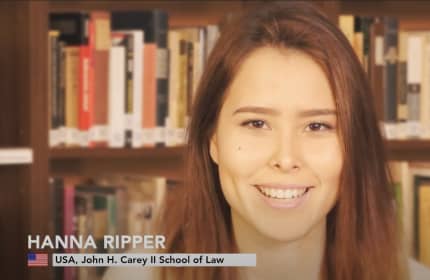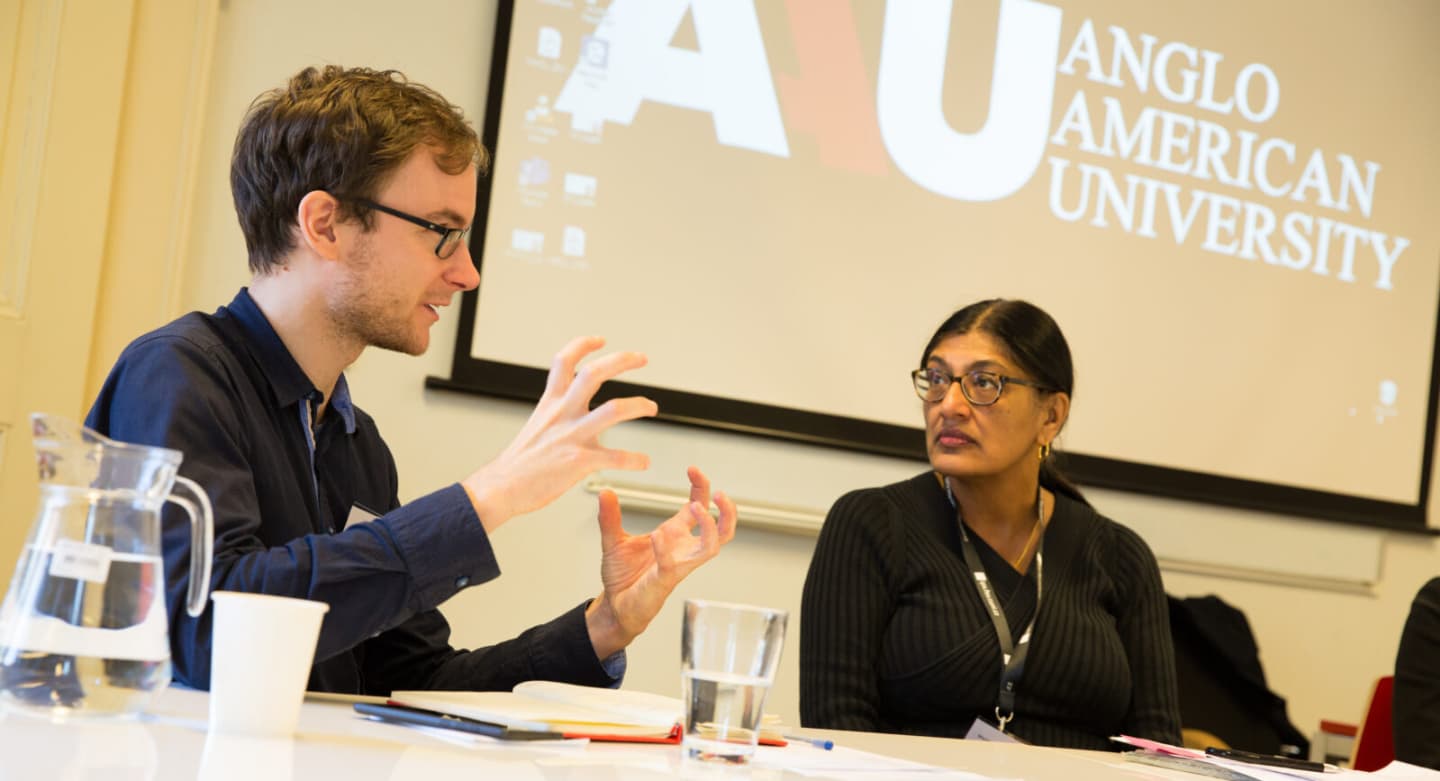
LLM in Law & Development
This LLM programme enables students to study a interdisciplinary field of law, economics and social development in English here in Prague.

| Accreditation | UoL |
| Degree | LLM |
| Duration | 1 Year |
| Tuition | CZK 450,000 |
| Intake | Fall |
| Deadline | Rolling Admission |

Download Brochure
Please submit your details in order to receive the brochure via email.
We would like to inform you that we currently don’t accept applicants for the LLM in Law & Development.
The Laws programmes are accredited in the United Kingdom, and therefore do not have Czech accreditation. This means that Law students are registered and study as Life-Long Learning students at AAU. As such, visa-seeking students should apply for a different type of visa and do not have student status in the Czech Republic. The coursework completed at AAU is utilized to assist students in developing their knowledge of the subject matter and preparing students to sit for the University of London examinations. UOL externally administers and grades all examinations. As such, AAU does not issue credits towards the UOL degree since all credits are awarded by UOL based on examinations and accredited in the United Kingdom.
About the Program
The University of London LLM programme, collectively referred to as Postgraduate Laws is a full law Master’s degree programme that puts graduates on the path to become specialized lawyers or professionals. The University of London world-class LLM is of international standing. It has been the next step in the careers of thousands of practising lawyers and professionals around the world.
The Postgraduate Laws programme is one of University of London’s Laws Programmes which are taught here in Prague, Czech Republic at Anglo-American University (AAU), a Recognized Teaching Centre of the University of London.

Students on the Law & Development track, may be able to also achieve specializations such as Human Rights Law, International Dispute Resolution, Environmental and Natural Resources Law, Public International Law, Economic Regulation, International Business Law, and more.
What does Postgraduate Laws include and how is this different than the LLM?
The Postgraduate Laws programme is a nested programme that includes 3 levels:
- Postgraduate Certificate in Law
- Postgraduate Diploma in Law
- LLM
Therefore, the LLM is the highest level of the Postgraduate Laws programme. These three levels are nested, which means that they are each completed after a certain number of modules has been undertaken. All three levels are completed within the 16 modules needed to graduate with the LLM.
The Postgraduate Certificate is completed after 5 modules, the Postgraduate Diploma is completed after 10 modules total (including the previous 5 modules for the Certificate), and finally, the full LLM is completed after all 16 modules are passed (including the 10 modules required for the Diploma).
This means that students don’t spend any additional time or money completing all three – rather they build upon each other.
Students can earn up to 3 total specializations – one for each level. This allows students to leave the Postgraduate Laws programme, and thereby the LLM, with an impressive demonstration of their specific knowledge and education!

Your Degree & After
Studying the LLM with the University of London gives students the following:
- In-depth and specialized knowledge in a particular area of law, with degree specializations demonstrating their knowledge;
- Opportunity to engage in cutting edge research and legal projects, thereby putting them on the forefront of their chosen field;
- A dynamic Master’s degrees, that will enhance their career prospects and put them on the path for further studies, such as a doctoral degree;
- A full degree from the University of London
The Postgraduate Laws programmes provide you with many of the key attributes required by law firms – advanced, specialist legal training and the ability to work in a multinational legal environment. Graduates of the University of London Postgraduate Laws programmes regularly advance to high-level positions in a variety of sectors, including banking, financial services, financial regulation, human rights agencies, NGOs and public service.
Hanna Ripper, Law student, Student of the Year 2016“I’m studying UK law taught by professors who know my name and genuinely care about me, with students from Montenegro, Tunisia, South Africa, and so on. I’m working a legal internship with an AAU alumni that has given me incredible experience and unique opportunities. All this against the magical backdrop that is the City of a Hundred Spires. What more could I ask for?”
Many professional associations and Bar Councils also accept UOL Postgraduate Laws qualifications towards professional development quotas. For example, in England and Wales, the Solicitors’ Regulation Authority accredits our programmes (including individual modules taken on a standalone basis) towards Continuing Professional Development (CPD) hours.
Program Structure
The LLM in Law & Development will be comprised of the following courses, which we believe will advance our students’ knowledge and career paths.
Following these courses you will find a list of optional courses that may be taught pending a minimum student enrollment.
Note: Each course is divided into a number of modules and each module will be taught over the course of two weekends.
United Nations Protection of Human Rights
This course will take you on a journey of discovering and studying the role of the United Nations in promoting and protecting human rights. The course aims to demonstrate how human rights enjoy an inspiring and effective framework within the UN system and its institutional structure. That framework was set out in the charter of the United Nations which was adopted in the wake of the Second World War and entered into force in October 1945. The course also takes you through the historical development of international human rights law, how human rights law operates under the UN and examines the relevant bodies and specialised agencies in this important legal area.
International Environmental Law
International Environmental Law is one of the most interesting and developing areas of Public International Law. It was only in the 1970s and 80s that states started to understand that the environment requires protection, that oceans should not be polluted, that species are declining. You will learn about the development of environmental law from this point onwards in this course. International Environmental Law is a highly topical area, reflected in the world news. We will deal with the legal implications of certain environmental actions, in the context of International Law generally as well as International Environmental Law. Related case law of international courts and tribunals are also important in this topic. This is a very extensive course, examining all the possible angles and new developments, aiming to enhance your understanding of the importance of international environmental regulations.
International Economic Law
What you will discover in this course is the law regulating international economic relations between estates, what role the United Nations has played and what the other international organisations including the World Bank, International Monetary Fund and the WTO have been doing. The course examines the international legal instruments in international economic law, adapted mainly after the establishment of the UN in 1945. We also cover relevant developments that took place prior to this.
International Investment law
This course is designed to give you exposure to the world of law concerned with the regulation of foreign investment. When a company goes abroad to invest, what are the risks the company takes – whether political or economic – and what are the rules of international law that protect foreign investments? The laws between the investing country and the host country as well as the interface between international investment law and other areas of international law are all covered in this course.
Possible Alternative Courses
The University of London provides a diverse and robust curriculum, with a selection of interesting and important courses, therefore AAU may teach optional courses as well. However, they are not currently scheduled and their availability will be subject to minimum student enrollment. Nonetheless, please do let us know if you are interested in one of these courses:
- European Convention on Human Rights
- Human Rights of Women
- International Natural Resources Law
- International Refugee Law
- International Rights of the Child
- Law of Treaties
- Transfer of Technology Law
- World Trade Law
AAU also offers skill-based support courses for Law students such as Fundamentals of Legal Research Writing and Analysis, Legal English, Legal Research and Writing, Moot Court, Legal Skills Development, and Cross Cultural Negotiations and Dispute Resolution.
For more information on the modular structure and the study program, please contact our admissions team at admissions@aauni.edu.
Additional information
- Learn more about tuition and scholarships.
- Learn more about graduate admission requirements.
- Explore our FAQ section.
- Should you have any further questions please email us at admissions@aauni.edu.
See what our students have to say
AAU offers the benefit of engaging with people and their cultures from around the world in the heart of one of the most beautiful cities in the world. In connection with the provided top tier education, you are offered a unique opportunity to start your career on an international level and make valued connections for your professional future.

Solicitor, Czech Republic
AAU’s Law school atmosphere is very friendly and tolerant. It allows you to study in an academic environment while having this family feeling around and you sort of feel at home.

John H. Carey II School of Law, Alumni
Meet the people
See all peopleDo you have questions?
We are happy to help!
Ask us a question!




